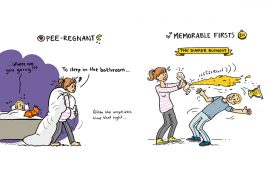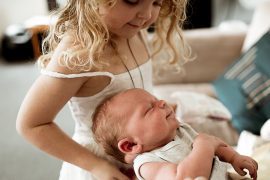2) RECOGNIZE EMOTIONS: Once you’ve made space for big emotions, the next step is to help children learn to recognize their feelings and the feelings of others. If kids are expressing their big feelings with actions like hurting others or otherwise acting out, see these actions as a form of communication – a cry for help. The phrase I turn to for patience and strength in these challenging moments is this:
“MISBEHAVIOR IS AN UNMET NEED.”
This moves me into thinking, “What’s the need?!” instead of “What is WRONG with this child?!”. With my own energies centered, I am then better equipped to approach the situation, maintaining my boundaries and respecting the child at the very same time. Instead of punishment, when we center ourselves first, we are then able to help children:
Think about and express how they were feeling.
Draw a connection between their feelings and why/how they acted out.
Consider their thoughts, words and actions. Tools like this set of (free) printable calming strategies with cute pictures kids can color along with words (designed for ages 3 to about 9) from the Time-In Toolkit are helpful as are any number of play based approaches to nurturing social and emotional skills in kids.
When we help children process their actions in connection to their thoughts and feelings, free from punishment, shame and blame, we are teaching important social and emotional skills in the most powerful way possible… and that is by example.
3) MODEL FORGIVENESS: There are times that feel impossible for us to keep our cool. Take the mom in my last parenting class who’s son threw a glass of water at her… a challenging moment to be sure. Despite of our best intentions, we are going to get knocked off center. Instead of beating ourselves up for our anger and frustration in times like these, we can see them as a teaching moment for us to model self love and acceptance in the face of our own mistakes. (Here this mum’s full question and my reply, minute 13:25, in this video replay.)
When we are aware of our own trigger moments, instead of beating ourselves up, we can simply apologize. The catch phrase we use in my home in the face of our teaching moments is this:
“MISTAKES HELP ME LEARN AND GROW.”
When we model self-love and forgiveness, children learn self-love and forgiveness. Share how you were feeling, what you might have done differently and something you learned. In doing so, you are teaching children that it is possible for us to learn from our mistakes free from shame.
Emotions in and of themselves are never a negative thing and everyday life affords us countless opportunities to support children in learning how to process their emotions. This is no small task, but the stakes are high and the rewards for doing so are even higher. Our very world and peace in our time depends on it.
Originally published HERE.
Mama of four, author and parent educator, Suzanne is the founder of Generation Mindful, a line of educational tools, toys and programs that teach kids about feelings, bringing mindful connection into everyday life. {Playfully!}










